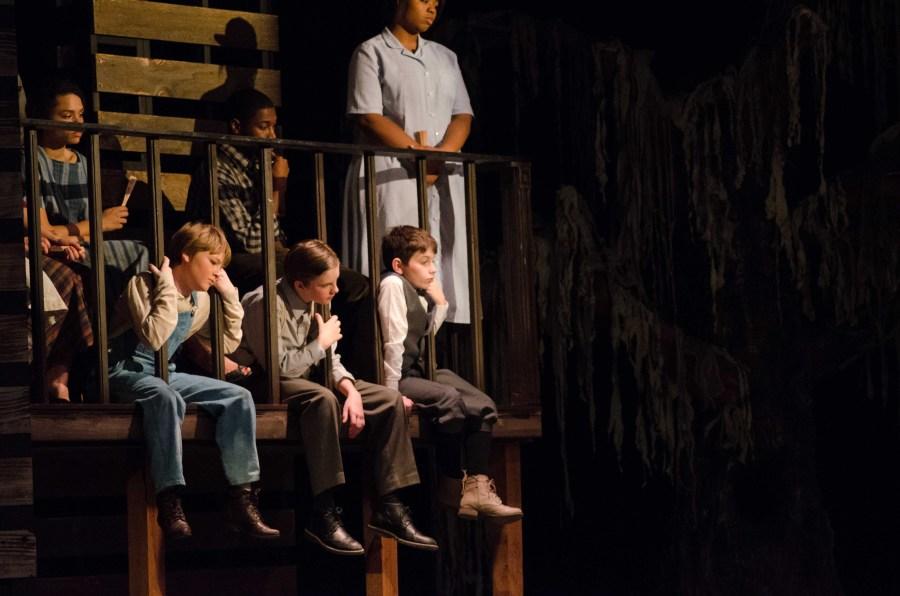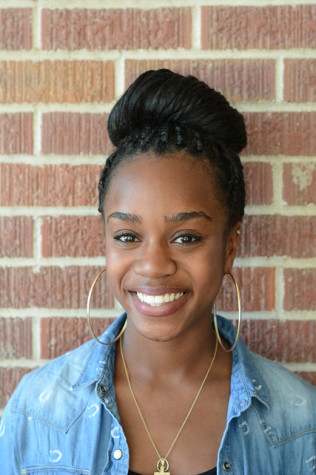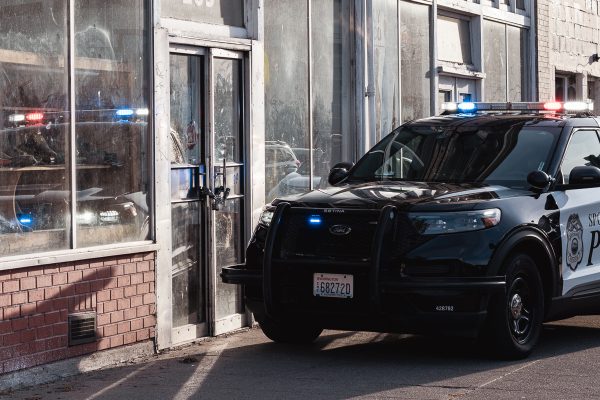EWU Theatre’s adaption relevant to current social injustice, racial issues
Left to right: Jean Louise Finch (Scout), played by Kady Cullen; Jemery Finch (Jem), played by Jameson Elton; Charles Baker Harris (Dill), played by Luke Hamburg.
November 19, 2014
The EWU theater program presented “To Kill a Mockingbird” on Nov. 14, a play adapted from Harper Lee’s book of the same name, by Christopher Sergel.
According to Sara Goff, Associate Professor of the threater department and director of the play, she read the book for the first time this past August. Goff said this play could not have come at a more convenient time.
“In August, the 24/7 news cycle was about Ferguson and Michael Brown,” said Goff. “It was an incredibly impactful reading for me because of how it was echoing themes from the 1960s when the book was written by Harper Lee and really ushered in the Civil Rights movement. So I think it speaks to a lot of what is going on right now.”
For Goff, this play has been an exciting one to work on and put together. Working with a cast of 33 actors and a much bigger crew, Goff said this is the biggest and most diverse cast and crew she has worked with.
“I am working with young actors for the first time. Actors who are about 10, 11, 12 years old, and so that’s a very exciting new challenge,” said Goff. “Sometimes when they really click in, you hear things out [of] such a young mouth, it’s arresting because of how truthful it is.”
This play features several inexperienced college actors, but the talent is still visible according to Goff.
Kellen Morgan, a senior majoring in philosophy with a double minor in theatre and music, is taking Eastern’s stage for the first time as Mr. Gilmer, the prosecuting attorney.
Morgan is well aware the character he is portraying is not necessarily a good guy and said he completely understands Goff’s vision for the play.
“[Goff] has talked about this a lot and her inspiration for the play. With everything going on in Ferguson and everything that has happened in Missouri and [with] Michael Brown, there is a message to be sent here,” said Morgan. “[Goff] said she has gotten asked a bunch of times by people, ‘Oh, you’re doing To Kill A Mockingbird? Is this still relevant?’ She is like, ‘Of course it is.’ I know that is her inspiration behind this production and she has done a great job getting that across to everyone.”
Chris Hansen, a senior majoring in theatre, is playing the primary antagonist, Bob Ewell.
Hansen said he was drawn to the play immediately based off its relevance in today’s society and his own personal views. He also said he feels this play is something our generation needs to know.
Although Hansen is glad the theatre department is doing this play, he said it was a difficult production for him to mentally prepare for.
“Bob is not a character I agree with in any way,” said Hansen. “It was very difficult for me to find a way to step into his mind and become this person I personally cannot stand. It was long and tedious, but I was able to find some joy in the sense that I realized my goal is to make people hate me and see what it does when you act that way.”
For Morgan, preparing for the play was an amazing experience.
“It was fun. Some of the weirdest, most awesome, most creative stuff I have ever done in my life,” said Morgan.
Goff said she would love for the catharsis experienced through the play to encourage the audience to view things differently than before. She said she hopes the audience examines their own sense of right and wrong within their conscience, and does not allow mob mentalities or other voices to drown out what their inner voice is telling them is right and wrong.
“I am interested to continue exploring thematic elements that are relevant and are happening right now when we turn on the television,” said Goff.
According to Hansen, he hopes the audience walks away with a new-found awareness.
“I hope the play will be a coming-together or a realization that we still have to deal with this and we need to be aware of it,” said Hansen. “I hope everyone can go away with a kinder heart and thought, like a waterfall starts with one drop, kind of an essence.”







![Simmons said the biggest reasons for her success this year were “God, hard work, and trusting [her] coach and what she has planned.”](https://theeasterner.org/wp-content/uploads/2024/05/image1-1-1200x800.jpg)


![Simmons said the biggest reasons for her success this year were “God, hard work, and trusting [her] coach and what she has planned.”](https://theeasterner.org/wp-content/uploads/2024/05/image1-1-600x400.jpg)






